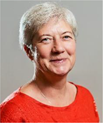Findings from the Northern Territory Low Emissions Hub CCUS business case project
Andrew Ross A * , Jody Rogers A , Bahman Joodi A , Mark Tocock A , Linda Stalker A , Jason Czapla A and David Green BA
B

Dr Andrew Ross has a PhD in Petroleum Geochemistry (University of Newcastle upon Tyne, UK, 2004), following his qualifications in petroleum geoscience, marine biology and oceanography. He joined CSIRO in 2004 and is group leader of the Geochemistry, Geosystems and Geodata teams (Energy Resources program). He has led research on marine geology and hydrocarbon seepage, the development of hydrocarbon sensor systems, oil spill monitoring, deep water environmental characterisation, CCS offshore monitoring and is currently focused on understanding mechanisms and approaches required for the energy transition. |

Jody Rogers has a BEng (ChemEng) and MBA from Curtin University and an MEng from the University of Western Australia. She joined CSIRO in 2022, prior to which she had over 25 years’ experience in the oil and gas industry holding several roles within Chevron Australia and Woodside Energy. Jody is a Principal Research Engineer and Techno-economic Modeller within the Geodata team in the Energy Resources program of CSIRO and is currently focused on the market development and business cases for NT energy transition. |

Bahman Joodi holds a PhD in Petroleum Engineering (Curtin University). He has dedicated his career to advancing energy projects of varying scales across diverse sectors including mining, oil and gas, health, manufacturing and education. With extensive experience in techno-economic analysis and a focus on reducing carbon footprint of energy sector, he has been a senior techno-economic analyst at CSIRO since 2024, contributing to assessment of opportunities to decarbonise industries. |

Dr Mark Tocock is an early career researcher receiving his PhD in Economics from the University of Tasmania in 2021. His interests include the fields of environmental and resource economics focusing on non-market valuation and agent-based modelling. Prior to joining CSIRO in 2022 he was involved in several research projects focused on water and species management as well soil stewardship. Currently Mark is working on supporting CSIRO’s Hydrogen Mission, researching the economic issues associated with the emerging hydrogen economy as well understanding the economics of CCS. |

Linda Stalker – Education/qualifications: BSc Hons Applied Geology (Strathclyde University, Scotland 1990) PhD Petroleum Geochemistry (University of Newcastle-upon-Tyne, UK, 1994) followed by academic and industry roles before joining CSIRO in 2000. She is a Senior Principal Research Scientist. |

Jason Czapla has worked in the resources sector for 20 years and is currently a Principal Research Engineer with CSIRO Energy. Jason holds a BSc (Mechanical Engineering) from Oregon State University and a PhD (Mechanical Engineering) from University of Queensland. He has worked internationally on onshore and offshore oil and gas projects. His academic focus has been on energy systems with a particular interest in thermodynamics and fluid mechanics. He was a founding member of an integrated geothermal power and lithium extraction energy start-up in California. |

Dr David Green has a PhD (Physics) from the University of Newcastle. Prior to joining CSIRO he worked for the US Department of Energy on advancing fusion energy (2008–2022). David joined CSIRO in August 2022 as a Principal Research Consultant within the Energy Systems program and is the Technoeconomic Lead within Energy Economics team, presently focused on integrated analysis of Australia’s energy system. Dr Green has led and conducted modelling, research and analysis to support Australia’s transition to net zero. |
Abstract
CSIRO has led a consortium in the delivery of a carbon capture utilisation and storage (CCUS) business case project. The project has assessed the requirements for a CCUS hub located in the vicinity of the Middle Arm, Darwin, Northern Territory. The particular emphasis of this project has been to understand how a CCUS hub development could link to wider decarbonisation activities and future industrial development. The outcomes from the project are broken into three parts. (1) Northern Territory and regional understanding of macro-economic drivers, emissions, product markets and best practice hub examples. (2) CCUS hub technical definition and technical risk reduction studies including a power systems optimisation study, identification of sector coupling opportunities, a CO2 shipping study and a Northern Territory CO2 utilisation roadmap. (3) Mapping the policy and regulatory environment, understanding the economic impacts of the CCUS hub development and suggested execution plans.
Keywords: business case, CCS, CCUS, CO2, decarbonisation, economics, efficiency, electricity, emissions, hub, hydrogen, industry, markets, net zero, Northern Territory, power generation, sector coupling, shipping.
 Dr Andrew Ross has a PhD in Petroleum Geochemistry (University of Newcastle upon Tyne, UK, 2004), following his qualifications in petroleum geoscience, marine biology and oceanography. He joined CSIRO in 2004 and is group leader of the Geochemistry, Geosystems and Geodata teams (Energy Resources program). He has led research on marine geology and hydrocarbon seepage, the development of hydrocarbon sensor systems, oil spill monitoring, deep water environmental characterisation, CCS offshore monitoring and is currently focused on understanding mechanisms and approaches required for the energy transition. |
 Jody Rogers has a BEng (ChemEng) and MBA from Curtin University and an MEng from the University of Western Australia. She joined CSIRO in 2022, prior to which she had over 25 years’ experience in the oil and gas industry holding several roles within Chevron Australia and Woodside Energy. Jody is a Principal Research Engineer and Techno-economic Modeller within the Geodata team in the Energy Resources program of CSIRO and is currently focused on the market development and business cases for NT energy transition. |
 Bahman Joodi holds a PhD in Petroleum Engineering (Curtin University). He has dedicated his career to advancing energy projects of varying scales across diverse sectors including mining, oil and gas, health, manufacturing and education. With extensive experience in techno-economic analysis and a focus on reducing carbon footprint of energy sector, he has been a senior techno-economic analyst at CSIRO since 2024, contributing to assessment of opportunities to decarbonise industries. |
 Dr Mark Tocock is an early career researcher receiving his PhD in Economics from the University of Tasmania in 2021. His interests include the fields of environmental and resource economics focusing on non-market valuation and agent-based modelling. Prior to joining CSIRO in 2022 he was involved in several research projects focused on water and species management as well soil stewardship. Currently Mark is working on supporting CSIRO’s Hydrogen Mission, researching the economic issues associated with the emerging hydrogen economy as well understanding the economics of CCS. |
 Linda Stalker – Education/qualifications: BSc Hons Applied Geology (Strathclyde University, Scotland 1990) PhD Petroleum Geochemistry (University of Newcastle-upon-Tyne, UK, 1994) followed by academic and industry roles before joining CSIRO in 2000. She is a Senior Principal Research Scientist. |
 Jason Czapla has worked in the resources sector for 20 years and is currently a Principal Research Engineer with CSIRO Energy. Jason holds a BSc (Mechanical Engineering) from Oregon State University and a PhD (Mechanical Engineering) from University of Queensland. He has worked internationally on onshore and offshore oil and gas projects. His academic focus has been on energy systems with a particular interest in thermodynamics and fluid mechanics. He was a founding member of an integrated geothermal power and lithium extraction energy start-up in California. |
 Dr David Green has a PhD (Physics) from the University of Newcastle. Prior to joining CSIRO he worked for the US Department of Energy on advancing fusion energy (2008–2022). David joined CSIRO in August 2022 as a Principal Research Consultant within the Energy Systems program and is the Technoeconomic Lead within Energy Economics team, presently focused on integrated analysis of Australia’s energy system. Dr Green has led and conducted modelling, research and analysis to support Australia’s transition to net zero. |


